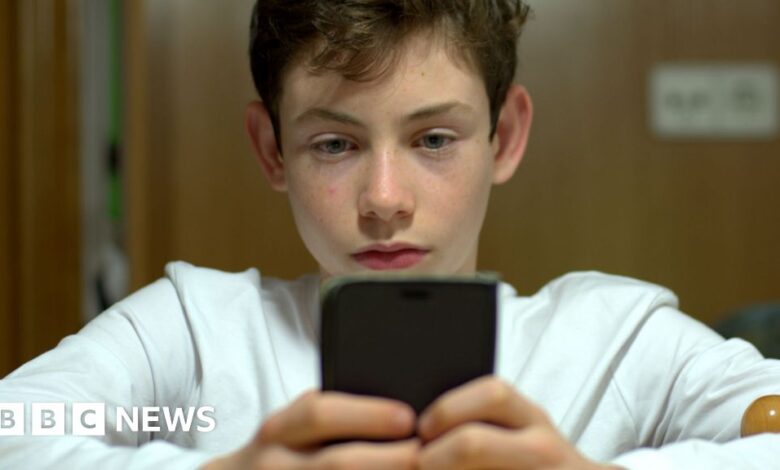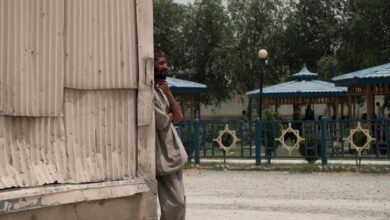Australia’s social media ban for under-16s approved by the Senate

Australia will ban children under 16 from using social networks after the country’s Senate passed the world’s strictest law.
The ban – which will not take effect for at least 12 months – could see tech companies fined up to A$50m ($32.5m; £25.7m) if they fail to comply .
Prime Minister Anthony Albanese said the law was needed to protect young people from the “harmful effects” of social media, something many parents’ groups have echoed.
But critics say questions about how the ban will work – and its impact on privacy and social connection – remain unanswered.
This is not the first global attempt to restrict children’s use of social media, but it involves the highest age limit set by any country and does not include exemptions for existing users or those with parental consent.
“This is a global issue and fundamentally we want young Australians to have a childhood,” Albanese said when introducing the bill to the House of Commons last week. “We hope parents can rest assured.”
After passing the Senate by 34 votes to 19 late on Thursday, the bill will return to the House of Commons – where the government has a majority, meaning passage is certain – to approve amendments. change, before becoming law.
The law does not specify which platforms will be banned. Those decisions will be made later by Australia’s communications minister, who will seek advice from the eSafety Commissioner – the internet regulator that will enforce the rules.
Gaming and messaging platforms are exempt, as are websites that can be accessed without an account, meaning YouTube, for example, would likely be exempt.
The government has said it will rely on some form of age verification technology to implement the restrictions and the options will be tested in the coming months. Social media platforms will be responsible for adding these processes themselves.
However, digital researchers have warned that there is no guarantee that the unknown technology – which could rely on biometrics or identification information – will work. Critics also sought assurances that privacy would be protected.
They also warn that restrictions can be easily circumvented through tools such as VPNs – which can disguise a user’s location and make it appear they are logging in from another country.
However, children who find ways to break the rules will not face punishment.
Polling on the reforms, although limited, shows it is supported by a majority of Australian parents and carers.
Amy Friedlander, one of the lobbyists for the ban, recently told the BBC: “For too long, parents have faced the impossible choice between allowing their children to use a device causing addiction or seeing your child isolated and feeling abandoned.”
“We have been trapped in a norm that no one wants to be a part of.”
However, many experts say the ban is “too blunt a tool” to effectively address the risks associated with using social networks and warn that the ban could push children into niches. less regulated on the Internet.
During the brief consultation period before the bill was passed, Google and Snap criticized the law for not providing more detail, and Meta said the bill would be “ineffective” and fail to meet its stated goal of helping children. I’m safer.
In its submission, TikTok said the government’s definition of a social media platform is so “broad and unclear” that “almost any online service could fall within that scope”. [it]”.
X questioned the “legality” of the bill – saying it may not be consistent with international regulations and human rights treaties to which Australia is a signatory.
Some youth advocates also accused the government of not fully understanding the role social media plays in their lives and of excluding them from the debate.
“We understand that we are vulnerable to the risks and negative impacts of social media… but we need to get involved,” wrote the eSafety Youth Council, which advises the regulator. developing solutions”.
Albanese acknowledged the debate was complicated but steadfastly defended the bill.
“We all know technology is moving very quickly and some people will try to find ways around these new laws but that is not a reason to ignore the responsibilities we have,” he said.
Last year, France introduced a law blocking access to social media for children under 15 without parental consent, although research shows that almost half of users are able to avoid the ban. banned by using VPN.
A law in the US state of Utah – similar to Australia’s – has been struck down by a federal judge as unconstitutional.
Australia’s laws are being watched with great interest by global leaders.
Norway recently pledged to follow in the country’s footsteps, and last week the UK’s technology secretary said a similar ban was “on the table” – although he later added “no right… at this time”.
Additional reporting by Tiffanie Turnbull in Sydney




